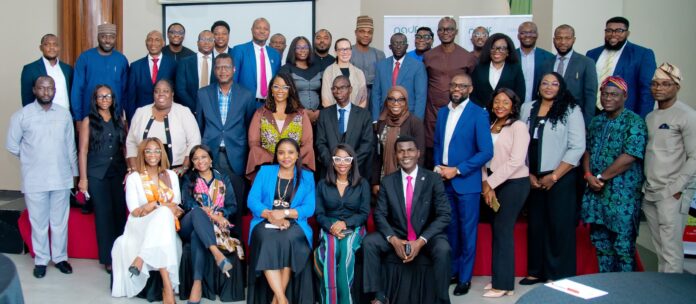The National Agricultural Development Fund (NADF) has taken a major step towards reshaping agricultural financing in Nigeria by successfully convening its inaugural NADF Networking Session with Fund Managers, a forum designed to strengthen partnership, deepen investment participation and unlock long-term capital for the country’s agrifood sector.
Held under the theme “Unlocking Agribusiness Financing in Nigeria: NADF as a Catalytic Partner”, the session which held at Oriental Hotel, Lagos on Wednesday, brought together leading fund managers, capital market operators, investment institutions, and development finance experts, marking a significant move by NADF to position agriculture within mainstream investment conversations.
The initiative according to NADF, aligns with President Bola Tinubu’s Renewed Hope Agenda, particularly the drive for food security and food sovereignty as central pillars of national economic stability.
In his keynote address, the Executive Secretary of NADF, Mohammed Ibrahim, stressed that transforming Nigeria’s agricultural sector requires structure, collaboration and a financing model capable of turning the sector’s vast potential into investable and sustainable value chains.
“We share a common goal-unlocking the full potential of Nigeria’s agriculture sector, the National Agricultural Development Fund was established to address financing constraints and enhance food security by providing structured support to farmers and agribusinesses.
“Our mission aligns profit with purpose, and partnerships with institutions such as yours are vital,” he told investors and fund managers.
Muhammed noted that agriculture, despite its significant contribution to GDP and employment, still attracts a disproportionately low share of private investment, saying NADF is strategically positioned to help close the gap by reducing risks, strengthening value chain coordination, supporting processors through backward integration and deploying blended financing instruments that attract commercial capital.
The Executive Secretary emphasised that NADF’s recent initiatives including on-lending programmes with banks, a digital farmer verification system, targeted support for women and youth and the AgGrow processor-led integration scheme—are designed to create a transparent, investable pipeline that supports both national priorities and investor expectations.
The guest speaker, Aakif Merchant, who is the Director of Engagement & Capacity-Building at Convergence Blended Finance, delivered a presentation on Blended Finance in Emerging Markets, highlighting global models Nigeria can leverage.
He emphasised what he called catalytic instruments such as guarantees, concenssional tranches and technical assistance to de-risk early stage or undeserved agricultural segment, commending NADF for its proactive steps to engage investment community towards Nigeria’s finance landscape to achieve food security.
Mr Bolaji Balogun, the Chief Executive Officer (CEO) of Chapel Hill Denham, praised NADF’s initiatives and made a strong call for urgent, long-term investment in agriculture.
He underscored agriculture’s centrality to Nigeria’s economic future, noting that the sector holds immense potentials to catalyse national development, revitalise rural economies, create millions of jobs, and generate significant export revenues.
Balogun stated that the country continues to fall short of this potentials because investments have not matched the scale of infrastructural needs such as processing equipment, storage facilities, logistics networks, and essential inputs.
He argued that Nigeria must transition from traditional bank-based financing to capital-market-led patient financing if agriculture is to thrive.
“The fundamental issue is how we begin to deploy much more long-term, patient financing into the sector, Agriculture requires capital that understands scale, gestation, and risk.
“We must embrace blended finance and longer-tenor investments if we are serious about unlocking the future of this economy.”
His intervention reinforced NADF’s position that sustainable food security requires strategic investment beyond seasonal lending-towards infrastructure, mechanisation, processing, and market connectivity across the entire value chain.
There were expert contributions from the investment community like Tony Idugboe, Chief Investment Officer of ARM Agribusiness Fund Managers Ltd, who noted that institutions like NADF play an essential bridging role between government objectives and the realities of market financing, emphasizing the need for blended, long-tenure instruments that can support farmers and processors more sustainably.
Similarly, Oluwatosin Ojo of Sahel Capital called for more specialised expertise and diverse funding sources-including philanthropic organisations, DFIs, commercial banks, and private capital providers-to address structural gaps in agriculture. According to him, a comprehensive financing approach is critical to strengthening food production, processing, distribution, and consumption in Nigeria.
A panel session on emerging trends and opportunities in agri-financing concluded the event, reinforcing the consensus that Nigeria’s agricultural transformation hinges on collaboration, patient capital, and innovative instruments that reduce risk while expanding investment confidence.
Overall, the session demonstrated NADF’s evolving role as a catalytic partner driving the kind of investment architecture needed not only to unlock agricultural potential but also to support the broader national effort to achieve food security and economic sovereignty under President Tinubu’s administration.
With stakeholders aligned around a shared vision and a clear financing pathway emerging, the conversation signalled renewed confidence that Nigeria’s agrifood sector is on a transformative trajectory-one that NADF is determined to champion.






